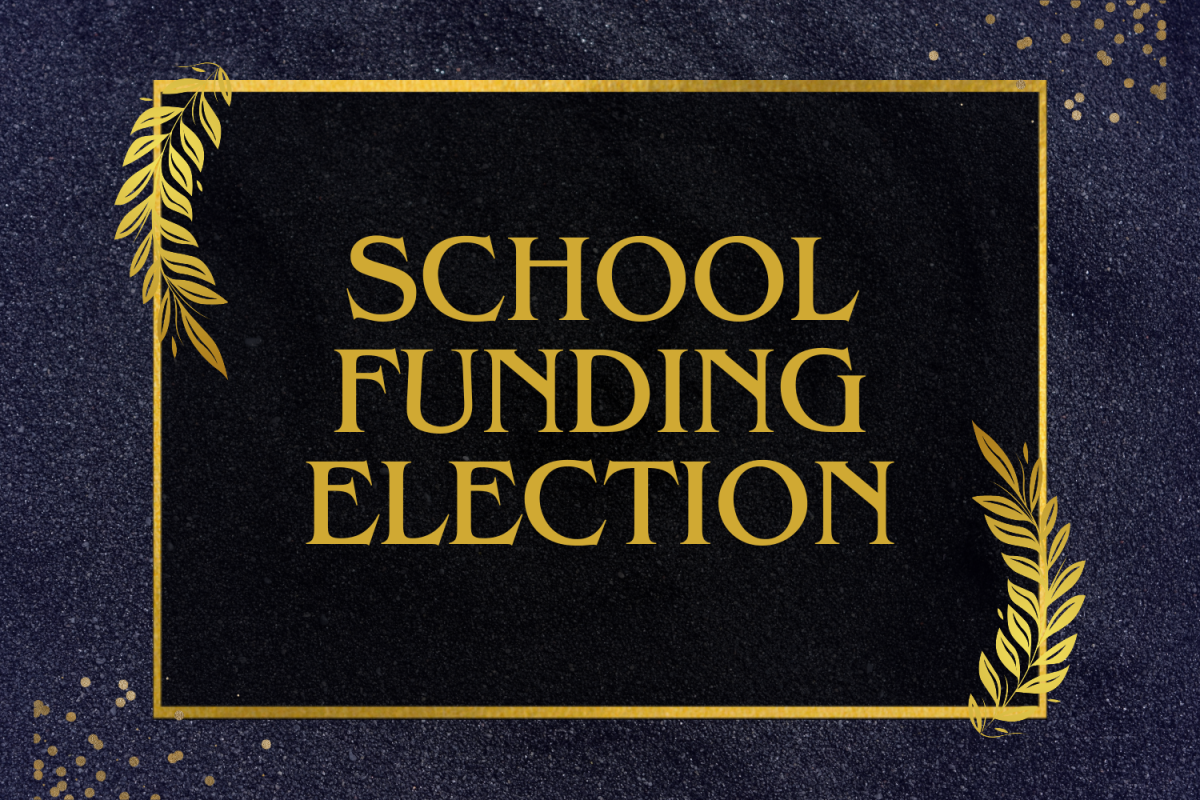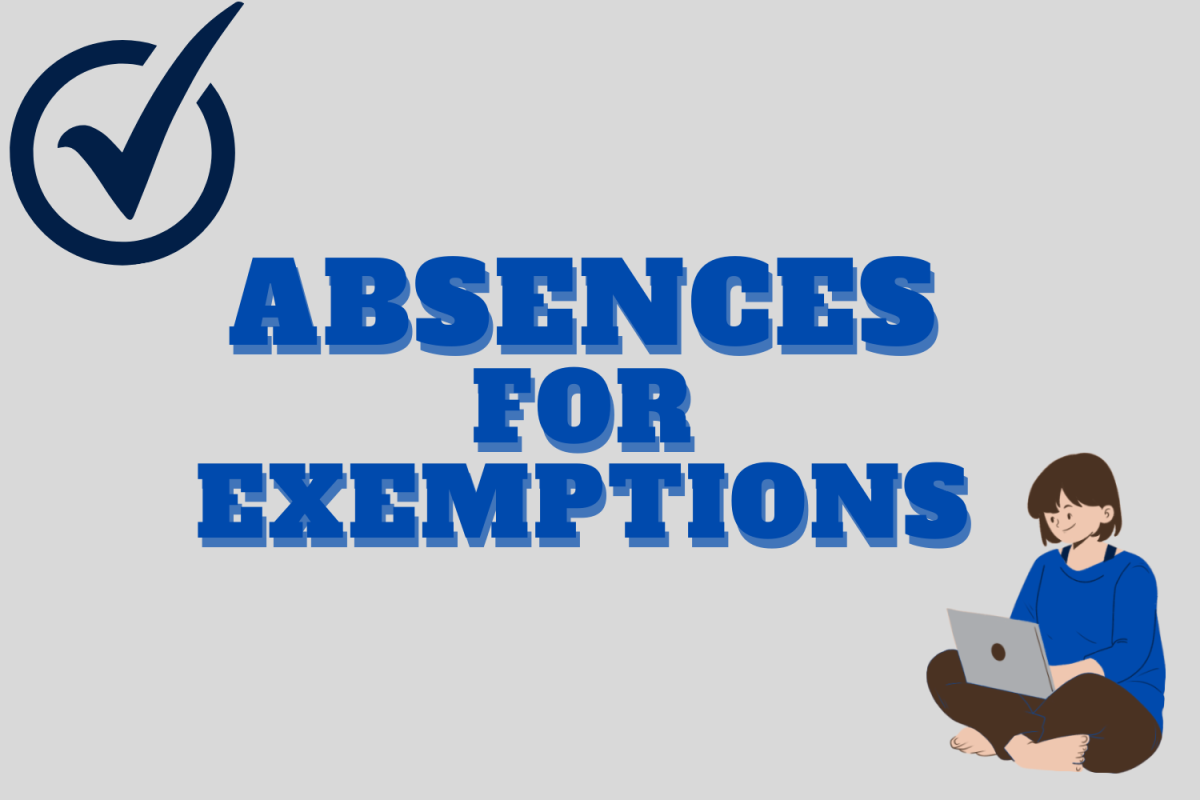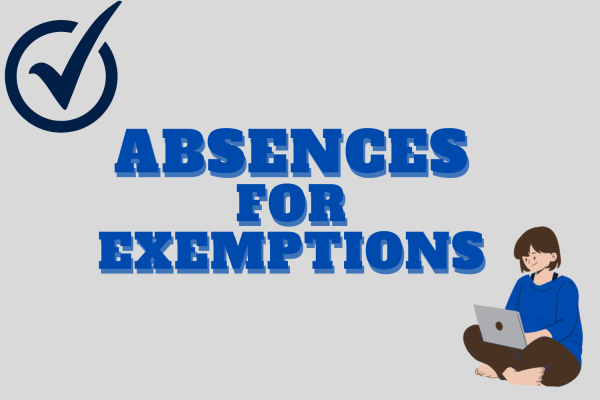Last year, the school decided to reduce the maximum number of absences for students to be able to exempt final exams at the end of the semester, and although school administrators have their valid reasons as to why this reduction has occurred, students have opposed this change as it has put extreme pressure on their attendance.
However, the history of exemptions hasn’t always been as uptight as it may seem so now.
“The number of absences was three excused and and three unexcused for a while,” associate principal Alyssa Albus said. “However it has since changed in the past three years due to COVID-19. Due to regulations that quarantine placed, the allowed number of absences increased to five during the 2020-2021 school year.”
The pandemic has played a major role in the changes with exemption policies, with relaxed policies previously being adopted to accommodate students missing weeks at a time due to COVID-19. However, with the passing of time, COVID-19 restrictions have been reduced as medical advancements helped restrict the spread of the virus, changing exemption policy in turn.
“During the 2022-2023 school year, the limit of number of absences to exempt became three in general, including both excused and unexcused absences,” Albus said. “This was done in order for students to become more motivated and aware of coming to school daily.”
Although reasonable, the change to the exemption policy has placed major strain on students’ academic life, with their health being put second to academics as a result of the three absences including absences excused by a doctor’s note or other documentation.
“As a student who severely dislikes getting behind, I typically try to be at school by any means possible regardless of the exemption policy. However, it does still influence me when it comes to appointments and vacations I schedule. I would rather have a Christmas break spent with check ups and dentist visits than risk not being able to exempt my finals,” senior Blaine Isom said. “As a straight-A student, I find it upsetting that even an annual check-up with my pediatrician for an hour will count against me for the three days of leeway allotted. Even with a signed doctor’s note, I could risk exemption or my personal health. It’s simply surprising that I could not be exempt by missing six days with a 95, but a student with three absences and an 85 could.”
As it seems, the regulations that are currently in place for exemptions have impacted students’ scheduling and simultaneously put risks on students’ personal health.
“The limited number of absences has affected me detrimentally,” senior Elena Bub said. “Just today, I forced myself to go to school even though I was sick. I had to drudge through the day, infecting people just so I could exempt my classes.”
Student’s personal health shouldn’t take a backseat to academics, but with the extreme expectations students uphold, it’s hard to recognize that. Even without the exemption policy, missing a day at school already has repercussions, with it taking students a day up to a week to catch up with all their classes. Compounding the policy with this fact, it makes missing a day even more punishing as students then have to rigorously study away at final exams they could have exempted if it had not been for their absences, which is not always fair. Sometimes, students simply cannot schedule around school hours or illnesses arise that the students cannot control, and the policy overlooks this fact.
Even associate principal Alyssa Albus acknowledges this issue with the new policy.
“Some negative outcomes out of the exemption policy we have placed within the last year revolve mainly around sickness. Being sick causes students to miss more days, and for those that want to be exempt, [being absent] isn’t really a favorable decision to make,” Albus said. “More and more students are coming to school sick to get the eligibility to exempt their finals at the end of the semester, and that’s not good as it then causes other students to get sick and eventually miss school.”
However, despite the problems the exemption policy may bring up, it equally also provides positive aspects that have contributed big-time to student development.
“Because of the absence limit change, students now have more awareness in coming to school as they are now more motivated to attend in order to be able to exempt their finals at the end of the semester,” Albus said. “There has been a [decrease in] missing assignments which essentially has led to higher test scores.”
It is evident that the changes in exemption policy have brought upon both negative and positive outcomes within the school. Many would even argue that the exemption policy is merely an incentive for being in school, as students get rewarded with the privilege of not having to take a final exam.
“I personally believe the exemption policy is a great motivation to be at school,” English teacher Jacob Schaefer said. “It is a good incentive for students to work hard to get good grades and often be present to be able to be exempt at the end of the semester.”
English teacher Kelly Collins also agrees with Mr. Schaefers’ statement but has witnessed from a teachers’ point of view the tough pressure the policy has placed on students.
“Some students have had certain absence issues that are due to sickness or even anxiety struggles that have forced them to stay at home and miss school,” Collins said. “In those cases, nothing can be done and students have to miss a day and potentially become unable to be exempt, which can be unfair. Regardless, I believe the policy is a good incentive and a creative way the school has come up with to get students to come to school.”
To further build on the value of the exemption policy as an incentive, the school even tested some new amendments to the policy on seniors during last year’s spring semester to keep them motivated.
“Within the past couple of years we have seen a rising number of seniors not attending school as regularly following spring break. By the second semester is when seniors start to usually care less about school as their graduation date nears, so they stop coming daily as basically senioritis sets in,” Albus said. “So in order to get seniors to want to come to school and prevent a bad case of senioritis from setting in, last year during the 2022-2023 school year, after spring break we placed a new policy. If seniors were present from after we came back from spring break all the way until the last day of school, they had the opportunity to exempt all their exams. This increased the daily attendance of seniors and was a great motivation for them to come to school daily.”
With the success of this policy seen on the seniors, the school has brought it back this year for all students, offering an extra exemption to those that are present all semester during strike time in third period.
“The new addition to our exemption policy this year is yet again meant to motivate students to be present at school daily,” Albus said, “as it is important for them to learn and ultimately graduate their senior year.”
While there is both benefits and disadvantages to the limit of absences on exemption policy, at the end of the day, it is all just to make a better learning environment for students as the school focuses on preparing students to go off to be successful in life and potentially make a positive impact in the world we live in.


















